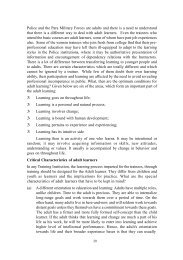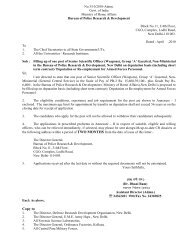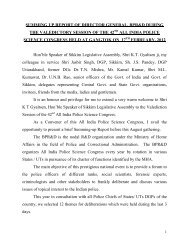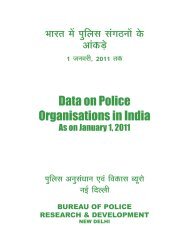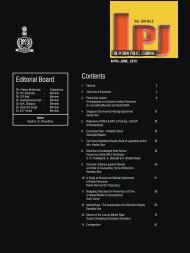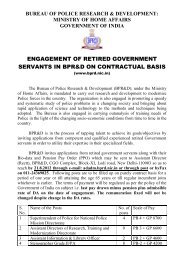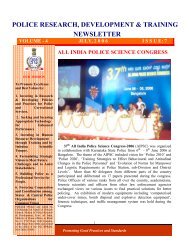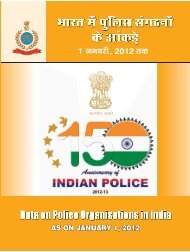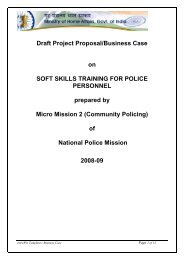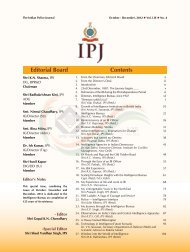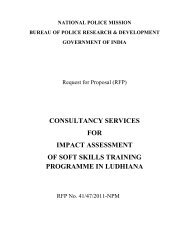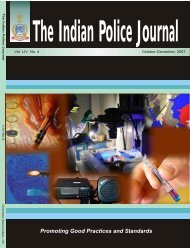SUPREME COURT & HIGHCOURT Rulings on POLICE
SUPREME COURT & HIGHCOURT Rulings on POLICE
SUPREME COURT & HIGHCOURT Rulings on POLICE
You also want an ePaper? Increase the reach of your titles
YUMPU automatically turns print PDFs into web optimized ePapers that Google loves.
Guidelines for Arrest : No arrest can be made because it is lawful for the police officer<br />
to do so. The existence of the power to arrest is <strong>on</strong>e thing. The justificati<strong>on</strong> for the<br />
exercise of it is quite another. The police officer must be able to justify the arrest apart<br />
from his power to do so. Arrest and detenti<strong>on</strong> in police lock-up of a pers<strong>on</strong> cause<br />
incalculable harm to the reputati<strong>on</strong> and self-esteem of a pers<strong>on</strong>. No arrest can be made<br />
in a routine manner <strong>on</strong> a mere allegati<strong>on</strong> of commissi<strong>on</strong> of an offence made against a<br />
pers<strong>on</strong>. It would be a prudent for-a police officer in the interest of protecti<strong>on</strong> of the<br />
c<strong>on</strong>stituti<strong>on</strong>al rights of a citizen and perhaps in his own interest that no arrest should be<br />
made without a reas<strong>on</strong>able satisfacti<strong>on</strong> reached after some investigati<strong>on</strong> as to the<br />
genuineness and b<strong>on</strong>a fides of a complaint and a reas<strong>on</strong>able belief both as to the<br />
pers<strong>on</strong>'s complicity and even so as to the need to effect arrest. Denying a pers<strong>on</strong> of his<br />
liberty is a serious matter. The recommendati<strong>on</strong>s of the Police Commissi<strong>on</strong> merely<br />
reflect the c<strong>on</strong>stituti<strong>on</strong>al c<strong>on</strong>comitants of the fundamental rights to pers<strong>on</strong>al liberty and<br />
freedom. A pers<strong>on</strong> is not liable to arrest merely <strong>on</strong> the suspici<strong>on</strong> of complicity in an<br />
offence. There must be some reas<strong>on</strong>able justificati<strong>on</strong> in the opini<strong>on</strong> of the officer<br />
effecting the arrest that such arrest is necessary and justified. Except in heinous<br />
offences, an arrest must be remanded if a police officer issues notice to pers<strong>on</strong> to<br />
attend the Stati<strong>on</strong> House and not to leave the stati<strong>on</strong> without permissi<strong>on</strong> would do.<br />
The right of the arrested pers<strong>on</strong> to have some<strong>on</strong>e informed, up<strong>on</strong> request and to c<strong>on</strong>sult<br />
privately with a lawyer was recognized by Secti<strong>on</strong> 56(1) of the Police and Criminal<br />
Evidence Act, 1984 in England. These rights are inherent in Articles 21 and 22(1) of the<br />
C<strong>on</strong>stituti<strong>on</strong> and require to be recognised and scrupulously protected. For effective<br />
enforcement of these fundamental rights, the following requirements are issued:<br />
1. An arrested pers<strong>on</strong>-being held in custody is entitled, if he so requests to have <strong>on</strong>e friend,<br />
relative or other pers<strong>on</strong> who is known to him or likely to take an interest in his welfare told<br />
as far as is practicable that he has been arrested and where he is being detained.<br />
2. The police officer shall inform the arrested pers<strong>on</strong> when he is brought to the police stati<strong>on</strong><br />
of this right.<br />
3. An entry shall be required to be made in the diary as to who was informed of the arrest.<br />
These protecti<strong>on</strong>s from power must be held to flow from Articles 21 and 22 (1) and<br />
enforced strictly.<br />
19



